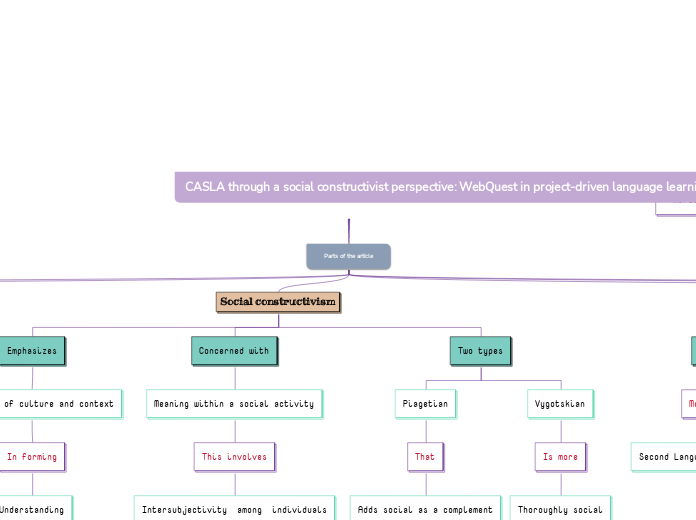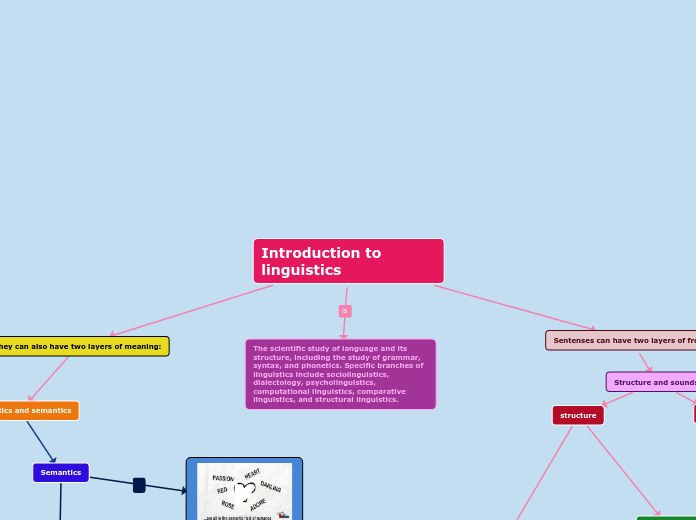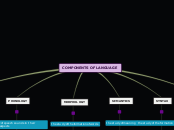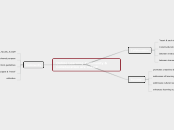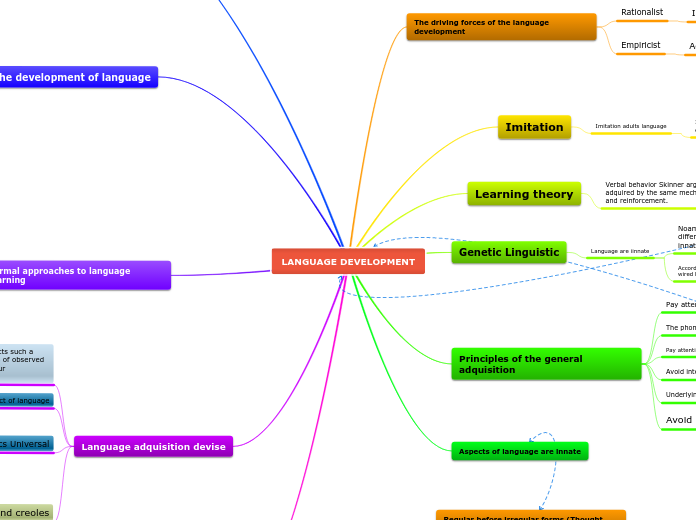Mariana Jaramillo Puerta
Obntaining
CALL
To create
Socio constructivism enviroments
Virtual enviroments
CASLA through a social constructivist perspective: WebQuest in project-driven language learning
Type in the name of the multiple-perspectives text.
Example: Bridge to Terabithia by Katherine Paterson
Parts of the article
Identify an important issue from the text that is being presented from different angles. Type it in.
Example: Jesse's drawing talent.
WebQuests in project-driven language learning
Seek
To achieve
Maximum connectivity and learner engagement
Stimulation of creative simulations
Research tasks
Language assignments
Example of
Information gap resolution model
Encouraging
Social constructivism and CASLA
Decide on the fourth point of view
Type in the name of the last character whose perspective on the issue you are going to present.
Example: Leslie Burke, Jesse's new next-door neighbor, and best friend.
The idea is
Combine
Computers use
Conditions
Are
Socio-affective
Pragmatics
Semantics
Cognitive
Is about
Structure
Involves
Morphology
Linguistics
CASLA
Computers Applications In Second Language Acquisition
Constructivism and SLA
Whose character does the third point of view belong to?
Type in his/her name.
Example: Mr. Aarons, Jesse's father.
Kowledge
L2
Second language
L1
is
Native language
Intervened by
Cognitive process
Divided in
Output
Writing
Speaking
Production
Input
Skills
Reading
Listening
Understood as
Reception
Cultural capital
Enriched by
Economic and sociocultural standing
Relevant
In the process of SLA
SLA
What does the character think, say or do that suggests their perspective on the issue?
Type in a quote and try to maintain the citation format.
Example: 'He would like to show his drawings to his dad, but he didn't dare. (...) He'd thought his dad would be pleased. He wasn't. What are they teaching in that damn school? he had asked.' (Paterson, 2.8)
Meaning
What kind of narration introduces the viewpoint?
Choose an answer:
First person point of view - using the personal pronouns 'I' or 'we'Second person point of view - using the personal pronoun 'you'Third person point of view - using the third-person pronouns 'he', 'she' and 'they'Omniscient point of view - an all-seeing observer tells the story
Second Language Acquisition
Social constructivism
Two types
Vygotskian
Is more
Thoroughly social
Piagetian
That
Adds social as a complement
Concerned with
Meaning within a social activity
This involves
Intersubjectivity among individuals
This means
Shared understanding among individuals
Emphasizes
Importance of culture and context
In forming
Understanding
Its basic principle
Knowledge is contructed
Social interaction
And is the result
Social processes
Decide on the second point of view
Name the character (it can either be the main character or one of the supporting characters) whose point of view you are presenting.
Example: Miss Edmunds, Jesse's music teacher.
Refers to
Point of view
Type in a relevant quote that highlights the character's point of view. Try to follow a citation format: author's name, chapter, and page.
Example: I can't get the poetry of the trees,' he said. She nodded. Don't worry,' she said. You will someday. He believed her.' (Paterson, 4. 24)
The nature of knowledge
How is the viewpoint introduced in the story?
Choose an answer:
First person point of view - using the personal pronouns 'I' or 'we'Second person point of view - using the personal pronoun 'you'Third person point of view - using the third-person pronouns 'he', 'she' and 'they'Omniscient point of view - an all-seeing observer tells the story
Says that
People construct
Own understanding and knowledge
About
The world
Experiencing and reflecting on these experiences
Learners construct
Their
Own knowledge
Through
Interaction with te enviroment
Theory of learning
Type in a quote that points out the character's position about the issue.
Try to follow a citation format: author's name, chapter, and page.
Example: 'She said he was unusually talented, and she hoped he wouldn't let anything discourage him.' (Paterson, 2. 8)
Influenced by
Vygotsky
Proposed the theory of
Zone of proximal development
The difference between
What a learner can do with assistance
What a learner can do on his own
In which learning
Encouraged with the help of the other
Approach to cognitive development
Sociocultural
Emphasized
Role of language and culture
Frameworks through which humans
Understand
Communicate
Experience
Thats mean
Cognitive operations
Originate in
Social interactions
Piaget
Deal with
Cognitive stages
Belived that
Children construct knowledge
Based on
Different experiences
Through interaction
Cognitive development
through a theory
Schemata
It is about
Mental structures
Used to
Process and identify information
These schemes can
Change, enlarge and become more sophisticated
With mental development
To the process of
Accommodation
Assimilation
Introduction
Decide on the first point of view you are going to present.
Type in the name of the character (it can either be the main character or one of the supporting characters) whose point of view belongs to.
Example: Jesse Oliver Aarons, Jr., the main character of the novel, a fifth-grader living in a rural Southern area.
Constructivism
Proposes
learning through interaction
With
Experiences
Physical enviroment
Social enviroment
Language Learning Theory
Type in a relevant quote that highlights the character's point of view towards
Parts of the article.
Try following a citation format: author's name, chapter, and page.
Example: 'Jesse drew the way some people drank whiskey. (...) Lord, he loved to draw. (...) When he was in first grade, he told his father that he wanted to be an artist when he grew up.' (Paterson, 2. 7)
Paradigm shift
What type of narration introduces the viewpoint?
Choose an answer:
First person point of view - using the personal pronouns 'I' or 'we'Second person point of view - using the personal pronoun 'you'Third person point of view - using the third-person pronouns 'he', 'she' and 'they'Omniscient point of view - an all-seeing observer tells the story
Learner as centre of learning
learn through
Use of computers
